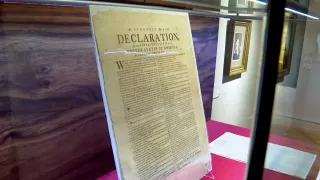March 23, 2021
Openly Gay North Korean Defector Finds Love, Plans to Marry
Kevin Schattenkirk READ TIME: 3 MIN.
After defecting North Korea 25 years ago, Jang Yeong-jin has found love and plans to marry his new American boyfriend this year, according to BBC.
In his 2015 autobiography "A Mark of Red Honor" – which was translated into English in 2017 – Yeong-jin explained that he married a woman at age 27. Despite feeling great affection for his wife, he found himself unattracted to women and sex was rare. The couple produced no children and, four years into the marriage, he told his brother he just wasn't aroused by women. His brother directed him to a doctor.
Yeong-jin explains that there is "no concepts of homosexuality in North Korea," and because of that "if a man says he doesn't like a woman, people [just] think he's unwell."
When he served in the military, Yeong-jin met a man who he recognized as having a similar problem. Without any cultural frame of reference, determining that he – and others like him – might be homosexual proved to be impossible. After spending time in a hospital, Yeong-jin was, as BBC notes, released "with a clean bill of health" – that is, no diagnosis for his lack of attraction to women.
However, Yeong-jin realized that neither he nor his wife were happy. A divorce would be too complicated, as North Korean courts would only grant it if the marriage was determined to "threaten the country's ideology," BBC notes. While no laws forbidding same-sex relations exist in North Korea, there are laws against extramarital relations. Yeong-jin realized that his only option was to defect.
What cemented his decision to defect was an awkward encounter with a childhood best friend, Seoncheol. Yeong-jin persuaded Seoncheol to stay the night, but nothing happened when they shared a bed. "I don't know what I wanted from him exactly – maybe I just wanted him to hug me tight," Yeong-jin said.
In Arpil 1997, Yeong-jin crawled across the de-militarized zone between the North and South and arrived in Seoul. Because of the land mines, crossing the de-militarized zone is uncommon to the point where his escape from the North made the news in the South.
Yeong-jin found that in the South, there was also very little awareness of homosexuality. After more than five months of questioning by national intelligence service agents in the South, one official, he says, "tole me that there should be a reason to dislike women."
Thirteen months after arriving in the South, in the Spring of 1998, he opened a magazine and saw an article about coming out with a photo of two men kissing in bed. "When I saw that, I knew right away that I was this kind of person. That's why I couldn't like women," Yeong-jin said.
In due course, he began frequenting Seoul's gay bars. At one point, Yeong-jin met and fell in love with an airline steward who, shockingly and tragically, ran off with Yeong-jin's life savings. This particular loss of innocence hit hard. "In North Korea, we live a very controlled life, so if I said I was duped by someone the party would track him down and punish him hard." He was hospitalized for a month, which he now suspects was due to the stress this situation imposed upon him.
It took a while for Yeong-jin to begin dating again. Then last year, he met his fiancé, Korean-American Min-su (a pseudonym given by the BBC) on a dating website and found himself traveling to the U.S. The couple have used the pandemic lockdown to get to know one another better, enjoying picnics and wine.
"The more I got to know this man, the more I could see that he had a very good character. Although he is eight years younger than me, he is the kind of person who likes to care for others first." Two months in, Min-su proposed. The couple will marry after Yeong-jin finalizes documents proving his first marriage in North Korea is over.
Even though his life is happier now, Yeong-jin cannot escape the consequences of his defection on his family. As the BBC notes, "Several of his relatives were banished to a remote village in the freezing north, a brutally familiar fate for those whose family members are perceived to have been disloyal to the regime. Six of his relatives died from hunger and illness, including his mother and four of his siblings."
Yeong-jin copes by putting pen to paper, saying, "Whenever I think of my family, it is too painful for me, so I decided to write. I believe that is now the only way that I can make it up to them."






